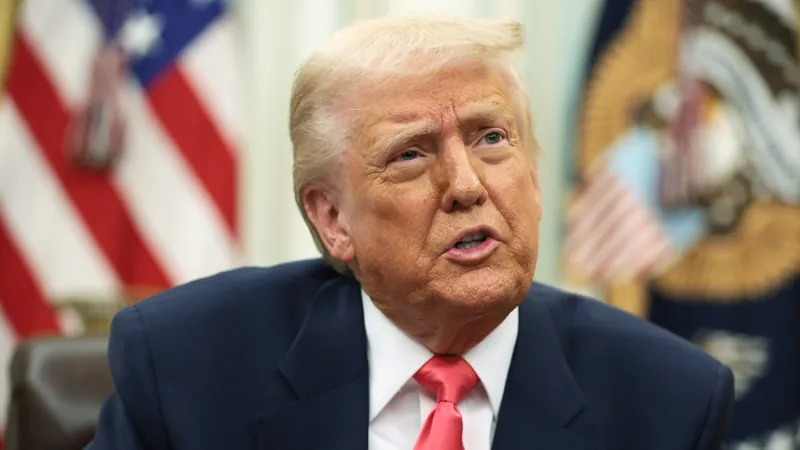
Constitutional Crisis Unfolds as Trump Administration Defies Courts
2025-03-19
Author: Chun
Constitutional Crisis Unfolds as Trump Administration Defies Courts
In a striking escalation of tensions between the Trump administration and the U.S. judicial system, recent actions taken under Donald Trump’s leadership signal a bold and controversial approach to governance. As the former President brazenly disregard judicial authority, American democracy faces a potentially seismic constitutional crisis.
Just days ago, Trump publicly criticized the judiciary, claiming it should be illegal to critique judges. This came as his administration flew planes carrying hundreds of Venezuelan migrants to El Salvador, seemingly in defiance of a federal judge's explicit order halting such deportations. This refusal to comply raises critical questions about the rule of law and executive authority in America.
White House Press Secretary Karoline Leavitt endorsed this defiance during an appearance on Fox News, arguing that judges should not be able to influence how a president conducts foreign relations. Attorney General Pam Bondi echoed this sentiment, declaring the administration's actions justified, even in light of the judge's ruling. She went so far as to accuse the judiciary of overstepping its boundaries in deciding matters of national security.
Trump's antagonism towards the judiciary has intensified; he referred to an opposing judge as a “Radical Left Lunatic,” further pushing for impeachment of judges who challenge his authority. This rhetoric encapsulates a broader pattern of dismissing judicial decisions that do not align with his agenda.
The current wave of defiance isn’t isolated. It reflects a broader trend wherein Trump and his administration attempt to circumvent court orders. Notably, Trump’s Vice President, J.D. Vance, has suggested judges lack the authority to restrain executive powers. Even after a different federal court mandated the reinstatement of federal employees unjustly terminated by Trump and his advisor Elon Musk, the administration openly scoffed at the ruling.
The implications of these actions are profound. Trump's decision to deport migrants—who have not been convicted of any crime—to a prison in El Salvador, known for its human rights violations, represents a significant test of the Constitution and the system of checks and balances designed to protect it. In justifying such actions, Trump invoked the Alien Enemies Act of 1798, which many legal experts contend is a misapplication of the law that was originally meant to address wartime issues.
The administration's insistence on moving rapidly to implement its agenda reflects a strategic approach: by taking swift actions, they anticipate that courts may struggle to keep pace and intervene. This tactic raises ethical questions and has led to heightened scrutiny. Legal experts are now warning that deliberate violations of court orders may venture into the realm of criminal contempt and obstruction of justice.
The current administration’s approach to governance suggests an unsettling belief that they operate above the law. As the conflict between Trump and the judiciary escalates, observers are left pondering how far this administration will go in its defiance and whether this could lead to a constitutional rupture in American governance.
In essence, as the Trump administration endeavors to push the boundaries of presidential power, the line between legal compliance and a flagrant dismissal of judicial authority draws alarmingly close. Will this lead to a constitutional crisis that redefines the role of the judiciary in America? With each new day, the situation grows increasingly precarious, and many are left asking: just how far will Trump push this defiance before facing legal repercussions?



 Brasil (PT)
Brasil (PT)
 Canada (EN)
Canada (EN)
 Chile (ES)
Chile (ES)
 Česko (CS)
Česko (CS)
 대한민국 (KO)
대한민국 (KO)
 España (ES)
España (ES)
 France (FR)
France (FR)
 Hong Kong (EN)
Hong Kong (EN)
 Italia (IT)
Italia (IT)
 日本 (JA)
日本 (JA)
 Magyarország (HU)
Magyarország (HU)
 Norge (NO)
Norge (NO)
 Polska (PL)
Polska (PL)
 Schweiz (DE)
Schweiz (DE)
 Singapore (EN)
Singapore (EN)
 Sverige (SV)
Sverige (SV)
 Suomi (FI)
Suomi (FI)
 Türkiye (TR)
Türkiye (TR)
 الإمارات العربية المتحدة (AR)
الإمارات العربية المتحدة (AR)